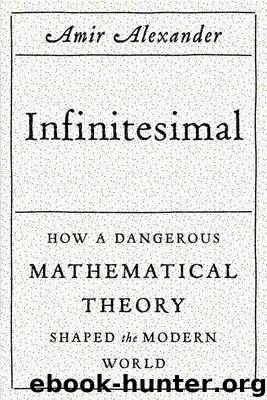Infinitesimal: How a Dangerous Mathematical Theory Shaped the Modern World by Alexander Amir

Author:Alexander, Amir [Alexander, Amir]
Language: eng
Format: epub
Publisher: Farrar, Straus and Giroux
Published: 2014-04-08T00:00:00+00:00
TWO DREAMS OF MODERNITY
By the 1670s the war over the infinitely small had ended. With Angeli at long last silenced, and all the Jesuits’ rivals driven underground or melting away, Italy was a land cleansed of infinitesimals, and the Jesuits reigned supreme. It was, for the Society, a great triumph, and it came at the end of a difficult campaign that had claimed many victims along the way. Some of them were famous in their day, such as Luca Valerio and Stefano degli Angeli, but many more will remain forever anonymous. The cold hand of the Society of Jesus drew a curtain over this lost generation of Italian mathematicians and left them in the dark.
The Jesuits did not fight this battle out of pettiness or spite, or merely to flex their muscle and humiliate their opponents. They fought it because they believed that their most cherished principles, and ultimately the fate of Christendom, were at stake. The Jesuits were forged in the crucible of the Reformation struggle, which saw the social and religious fabric of the Christian West tearing at the seams. Competing revelations, theologies, political ideologies, and class loyalties were all vying for the minds and souls of the people of western Europe, leading to chaos, hunger, pestilence, and decades of warfare. The one and only Truth of the ancient Church, which had united Christians and given purpose to their years, had suddenly disappeared amid the clamor of rival creeds. Reversing this catastrophe, and ensuring that it never recurred, was the overriding purpose of the Society of Jesus from the day of its founding by Ignatius of Loyola.
The Jesuits pursued this goal in many ways, but always with energy, skill, and determination. They became expert theologians dedicated to formulating a single religious truth, and expert philosophers to support their theology. And they founded the largest educational system the world had ever seen, in order to disseminate knowledge of these truths far and wide. They were the engine of the Catholic revival in the second half of the sixteenth century and played a key role in halting the spread of the Reformation and reversing some of its gains.
But the Jesuits were confronted with a pesky problem: different opinions were everywhere, and every religious or philosophical doctrine was seemingly in contention between different authorities. Except, that is, in mathematics. This at least was the opinion of Christopher Clavius, who began advocating for the field at the Collegio Romano in the 1560s and ’70s. In mathematics, and especially in Euclidean geometry, there was never any doubt, Clavius argued, and he ultimately made mathematics a pillar of the Jesuit worldview.
It is because of their deep investment in mathematics, and their conviction that its truths guaranteed stability, that the Jesuits reacted with such fury to the rise of infinitesimal methods. For the mathematics of the infinitely small was everything that Euclidean geometry was not. Where geometry began with clear universal principles, the new methods began with a vague and unreliable intuition that objects were made of a multitude of minuscule parts.
Download
This site does not store any files on its server. We only index and link to content provided by other sites. Please contact the content providers to delete copyright contents if any and email us, we'll remove relevant links or contents immediately.
| Applied | Geometry & Topology |
| History | Infinity |
| Mathematical Analysis | Matrices |
| Number Systems | Popular & Elementary |
| Pure Mathematics | Reference |
| Research | Study & Teaching |
| Transformations | Trigonometry |
Modelling of Convective Heat and Mass Transfer in Rotating Flows by Igor V. Shevchuk(6432)
Weapons of Math Destruction by Cathy O'Neil(6264)
Factfulness: Ten Reasons We're Wrong About the World – and Why Things Are Better Than You Think by Hans Rosling(4731)
A Mind For Numbers: How to Excel at Math and Science (Even If You Flunked Algebra) by Barbara Oakley(3301)
Descartes' Error by Antonio Damasio(3270)
Factfulness_Ten Reasons We're Wrong About the World_and Why Things Are Better Than You Think by Hans Rosling(3230)
TCP IP by Todd Lammle(3180)
Fooled by Randomness: The Hidden Role of Chance in Life and in the Markets by Nassim Nicholas Taleb(3105)
The Tyranny of Metrics by Jerry Z. Muller(3065)
Applied Predictive Modeling by Max Kuhn & Kjell Johnson(3064)
The Book of Numbers by Peter Bentley(2964)
The Great Unknown by Marcus du Sautoy(2690)
Once Upon an Algorithm by Martin Erwig(2641)
Easy Algebra Step-by-Step by Sandra Luna McCune(2628)
Lady Luck by Kristen Ashley(2576)
Police Exams Prep 2018-2019 by Kaplan Test Prep(2540)
Practical Guide To Principal Component Methods in R (Multivariate Analysis Book 2) by Alboukadel Kassambara(2538)
All Things Reconsidered by Bill Thompson III(2389)
Linear Time-Invariant Systems, Behaviors and Modules by Ulrich Oberst & Martin Scheicher & Ingrid Scheicher(2364)
